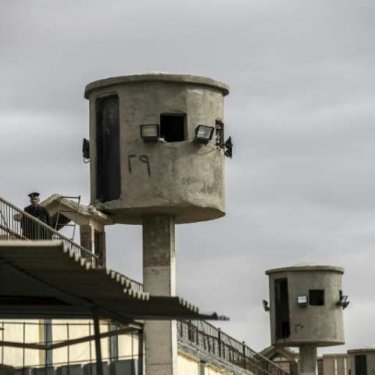RSF asks UN to intervene to end systematic arbitrary detention of journalists in Egypt

At a time when at least 29 journalists are imprisoned in Egypt, Reporters Without Borders (RSF) has written to the United Nations Working Group on Arbitrary Detention accusing the Egyptian authorities of systematically detaining critical journalists in an arbitrary manner, and asking the UN to intervene urgently to ensure respect for the right of these journalists to freedom of expression and due process.
Sent on 30 April, RSF’s letter details the cases of ten journalists. The examples reflect the diversity of situations of arbitrary detention in Egypt, but all of the journalists are imprisoned on spurious grounds such as “participating in a terrorist group,” “spreading false news” or “inciting demonstrations.” The circumstances of their arrests and the interrogations they have undergone show that their only crime was exercising their right to freedom of expression and information, and expressing criticism of the Egyptian authorities.
As well as being denied due process and subjected to enforced disappearance and even acts of torture, these journalists continue to be detained arbitrarily while the Covid-19 epidemic rages in Egypt, exposing them to the risk of infection and death. RSF therefore asks the Working Group, a subsidiary body of the UN Human Rights Council, to intervene as a matter of urgency with the Egyptian authorities in order to put an end to these systematic violations.
Most of these ten journalists are being subjected to prolonged provisional detention of indefinite duration. This is the case, for example, with Esraa Abdel Fattah, held since October 2019, Solafa Magdy, held since 26 November 2019, Adel Sabry, held since 3 April 2018, and Hisham Fouad and Hossam Moanis, who have been held since 25 June 2019. Some of these provisional detentions have even been prolonged beyond the maximum period allowed under Egyptian law. This is the case with Moataz Wednan, who has been detained provisionally for nearly two and a half years.
Other journalists are being kept arbitrarily in detention although orders have been issued for their release. This is the case, for example, with Mahmoud Hussein and Badr Mohammed Badr. The former, who was arrested in December 2016 for “spreading false news,” spent two and a half years in pre-trial detention before a court ordered his release. He was nonetheless not released and instead continued to be held on the grounds that new proceedings had been initiated against him on spurious charges of “participating in a terrorist group.” He is still being held pending trial. The latter, Badr Mohammed Badr, who was arrested in March 2017 for “participating in a terrorist group” and “spreading false news,” was the subject of a release order issued by a court on 24 November 2019. He was not however freed and instead disappeared for nearly three months, reappearing on 25 February 2020 before a court where new proceedings on unspecified charges were initiated against him. He, too, continues to be detained.
Like Badr Mohammed Badr, other journalists have disappeared while detained by the authorities, contrary to international law, which says the lawyers and families of detainees must be able to contact them. Esraa Abdel Fattah and Solafa Magdy disappeared for 24 hours after their arrest. Moataz Wednan disappeared for a week. Mohamed Ibrahim Radwan disappeared for 11 days after being arrested in April 2018. He reappeared before a court for trial on charges of “participating in a terrorist group” and “spreading false news.” After he had spent 15 months in provisional detention (longer than the maximum period allowed under Egyptian law), his release was ordered on 31 July 2019, but he continued to be held for another ten days for no legitimate reason.
Some journalists have been given prison sentences of totally disproportionate length. Ismail Al Sayed Mohamed Omar Tawfik, also known by the pseudonym of Ismail “Alexandrani,” was sentenced on 22 May 2018, after more than three years of provisional detention, to ten years in prison for “participating in a terrorist group,” “participating in a criminal conspiracy,” “illegally obtaining and divulging state secrets” and “spreading rumours in order to harm the national interest.” His crime was criticizing the authorities in several international media outlets such as Al Jazeera and Orient XXI and observing the situation in the sensitive Sinai region a bit too closely.
All of these journalists have been subjected to procedural irregularities including denial of access to their lawyers, excessively long provisional detention, denial of medical care and failure to respect trial procedure. Many of them, such as Esraa Abdel Fattah, Solafa Magdy and Mohammed Ibrahim Radwan, have also been subjected to violence or even torture during provisional detention. Many of them, as the families of Solafa Magdy and Mahmoud Hussein testify, have had their visiting rights severely restricted during the Covid-19 pandemic, making their detention even harder to bear.
Egypt is ranked 166th out of 180 countries in RSF’s 2020 World Press Freedom Index.



